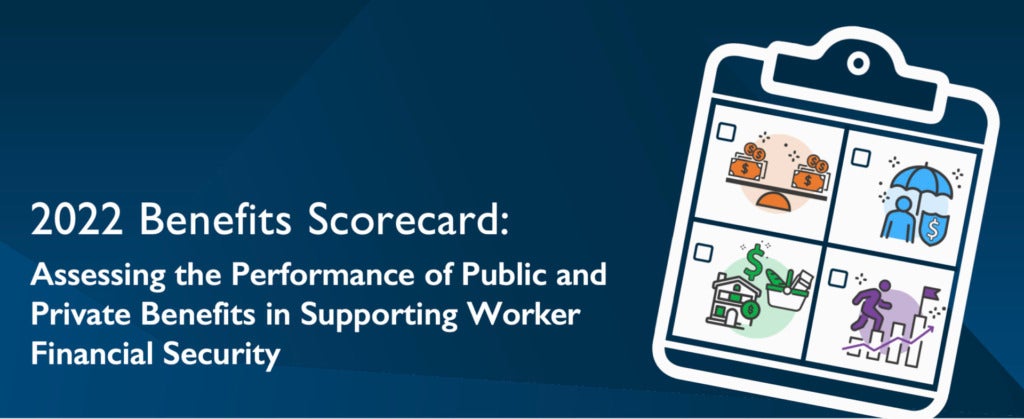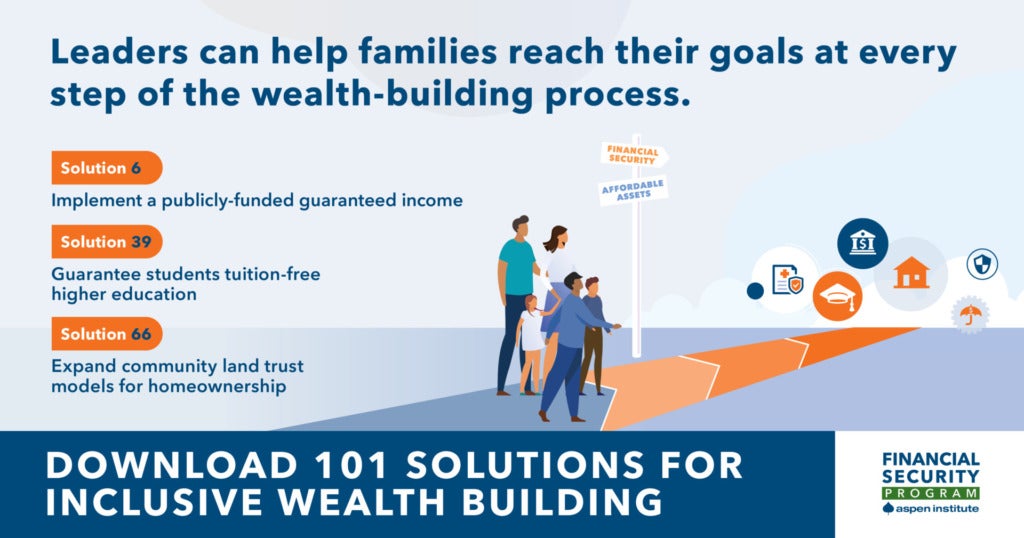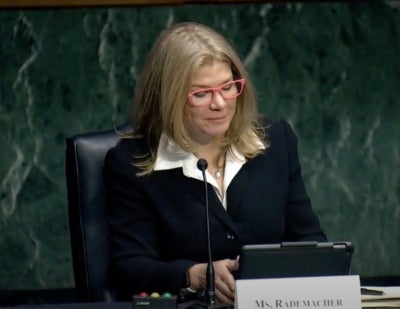In our landmark report, The State of Financial Security, we assert that financial insecurity is a solvable problem if we commit ourselves, as leaders across sectors, to systemic change. Just over two years later, on the heels of a global pandemic, with inflation and other household economic stressors in the news nightly, we continue to see the need for serious changes across our systems and sustained commitment to making financial security a national priority. But we also see opportunity – real movement happened in 2022, from honest conversations about removing roadblocks to wealth creation and the need to stand up a national commission on financial inclusion to game-changing progress on critical short-term financial resilience solutions such as workplace emergency savings.
At the Aspen Financial Security Program, we seek to accelerate critical systems changes that will make the fundamentals of household financial security – routinely positive cash flow, public and workplace benefits that work, and personal savings and dignified wealth – possible for everyone at every life stage. Working at the nexus of policy and market innovation, we collaborate with various leaders – researchers, advocates, industry, and policymakers – to advance solutions that will ensure that every household can be financially resilient in the short term and financially secure in the long term.
In 2023, we’re keeping last year’s momentum going, in partnership with leaders like you, on four ideas that are continuing to have a significant impact:
FOUR IDEAS MAKING AN IMPACT
1. The United States Needs a National Financial Inclusion Strategy
In 2022, Aspen FSP led over 110 companies and organizations in calling on the Biden Administration to establish a Presidential Commission on Financial Inclusion that would create a first-of-its-kind national financial inclusion strategy. The diversity of supporters for this call – from banks and credit unions to payments and technology companies, from credit bureaus to consumer advocates – highlights the outpouring of support for the idea of a whole-of-government approach to building a more inclusive financial system that is a pathway to wealth creation and financial security for all people in this country.
Since then, we’ve had encouraging conversations with key leaders in government, the private sector, and nonprofits moving us closer to the vision of a national financial inclusion strategy. We anticipate exciting announcements, with these change-makers poised to take action.
Learn more about the organizations calling on the Administration for action.
2. To Achieve Household Financial Resilience, We Must Simultaneously Prioritize and Modernize Public and Workplace Benefits
If there is one thing we have learned during the past few years, it is that volatility is the new normal. Financial shocks, both extraordinary – like a pandemic, natural disaster, or unexpected job loss – and routine – like a blown tire, a surprise school fee, or an inflation-boosted grocery bill – require that households be financially resilient in the face of both income dips and expense spikes. Public and workplace benefits are our primary tools for helping households in America to achieve resilience. Still, we have work to modernize their design and delivery and ensure that everyone in America can benefit from these critical non-labor income supports, no matter who they are.
At Aspen FSP’s first-ever Benefits21 Leadership Forum in April 2022, we unveiled our Benefits Scorecard, which establishes a first-of-its-kind baseline evaluation of the performance of twenty-two of the most prevalent public and private benefits. Not only did we use publicly available data to compare glaring gaps in access across these benefits, we also evaluated these benefits based on the quality of delivery, value, and inclusion. The headline: across public and workplace benefits, and across sectors, there is a significant opportunity – and a need – for improvement.
So, what’s ahead? To modernize public benefits, we are seizing opportunities presented by a multiagency federal initiative to address household financial shocks to convene a community of innovative state and federal leaders in an active partnership to scale tech-enabled approaches to modernizing public benefits delivery across programs. The knowledge we have gained from private sector partners, and nonprofits in modernizing government technology and facilitating payment delivery to people during the pandemic will inform these insights.
And in workplace benefits, we’re leaning into the systems change that will scale critical financial resilience workplace benefits. The passage of SECURE 2.0 at the end of 2022, which will allow employers to automatically enroll employees into emergency savings accounts within retirement plans, provides a blueprint for Aspen FSP’s approach to person-centered, market-informed benefits policy change. When we start with what is true in people’s financial lives, convene experts from across sectors, find the best evidence from across the globe on what works, and partner with peers to provide policymakers with the best collective thinking, the Aspen Institute can be a powerful platform for impact. e will continue to put that toolbox to work on “out of plan” workplace emergency savings and explore opportunities to scale additional financial resilience benefits – like paid leave or hardship funds – in 2024 and beyond.
Download the Benefits Scorecard.
3. By 2050, We Can 10x the Wealth of Households in the Bottom Half of the Wealth Distribution
Aspen FSP’s Foundations of a New Wealth Agenda synthesizes insights surfaced by the members of our Consumer Insights Collaborative and arrives at a provocative conclusion: personal wealth—the savings and assets a family owns, minus their debts— is a requirement for the well-being of families with lower incomes just as it is for those with higher incomes.
With the bottom 50% of the U.S. population owning just 2% of the nation’s wealth – and with thirteen million households living with negative net worth – it’s clear that that idea is not yet broadly accepted. But when enough leaders adopt the view that America is better when everyone can benefit from the functions of wealth, we can create a future of wealth that is good for households, our economy, and our democracy. We must tackle wealth inequality– particularly racial wealth inequality – with the same level of energy, creativity, accountability, specificity, and investment that our climate leaders have brought to their decades-long fight. Inspired by the now-ubiquitous “net zero” target for carbon emissions, Aspen FSP is asking, By 2050, what will it take to 10x the wealth owned by households in the bottom half of the wealth distribution?
Fortunately, we have many of the tools we need. Aspen FSP’s April 2022 101 Solutions for Inclusive Wealth Building documented a comprehensive list of the solutions that we know can push the needle toward a future of inclusive wealth. And in late 2022, in partnership with The BridgeSpan group, we convened the Future of Wealth Solutions Lab, a group of cross-sector leaders working on the frontier of wealth-building innovation. With these future-forward thinkers, we spent three days dissecting, challenging, and distilling 101 solutions down to a priority list of focus areas – and identified the “capital stack,” narrative change, and movement-building resources innovators will need on their journey to bring about a better future of wealth.
But while we envision a different future, we have to improve people’s lives today. Our analysis of 2019 Survey of Consumer Finances data showed that student loan debt is the primary driver of financial insecurity for negative net worth households. In January 2022, we recommended the federal government cancel at least $30,000 in debt per borrower to put millions of people on a more sustainable path to financial security. In August 2022, the Biden Administration unveiled a plan to cancel some student debt for the majority of borrowers and $20,000 for those who borrowed while receiving Pell Grants in debt cancellation for some borrowers. In early January 2023, the Administration shared planned reforms to student loan repayment programs that incorporate many of our recommendations.
In 2023, Aspen FSP will publish a new Wealth Agenda. This focused, targeted roadmap will be an unmistakable call to action to leaders from across sectors, working in different ways to improve households’ financial resilience and security. We will be right there with you, putting all of our Aspen Institute Financial Security Program tools to work toward a better future of wealth.
Download 101 Solutions for Inclusive Wealth Building.
4. An Inclusive Saving and Investing System is Essential for a Future of Equitable Wealth
With our collaborators at Morningstar and the Defined Contribution Institutional Investment Association, we are building a first-of-its-kind data and action platform to expand the wealth-building potential of the 401(k) system. By inviting pioneering employers and their service providers to connect 401(k) transactional data and their employee demographic data, we will have the first publicly available insights into how our defined contribution savings system – with $10.4 trillion in assets – is, or is not, working for American households.
In addition to grappling with the most pressing issues in inclusive retirement savings, we also challenged ourselves to think about the life cycles of wealth building. We convened leaders to share ideas and perspectives around wealth building across a lifespan and accounts that use the powerful rates of return from the capital markets beginning in childhood.
Our work to highlight automatic in-plan and out-of-plan emergency savings solutions for policymakers and corporate leaders made headway this year. We were grateful to testify before the Senate Health, Education, Labor, and Pension Committee on key legislation that was included in the SECURE 2.0 passage, a package that includes retirement and workplace savings policies. We also led a broad coalition of cross-sector stakeholders to elevate and advance promising policy solutions. In partnership with several key organizations, we released “Joint Principles for Effective Emergency Savings Policy” to highlight key insights for durable emergency savings policy for policymakers.
Watch the Senate HELP Testimony.
Ida Rademacher, Executive Director of Aspen FSP, and Vice President of the Aspen Institute testified before the Senate HELP Committee on policy proposals to strengthen our retirement and savings system.
OUR FOCUS ON 2023
As we embark on 2023, we are in awe of the work we have done as a community, grateful for our partners in leadership, and remain committed to creating a new financial culture where everyone has the opportunity to build wealth. Access to sufficient combinations of positive cash flow, personal resources, and public and private benefits are as necessary as ever for households to achieve financial security. Our work together is critical, but progress is possible (and happening).
We appreciate the hard work of our dedicated partners, funders, and network in your commitment to building financial security for all households in America. Here is what we have slated for the upcoming year:
- Elevate and support leaders and leading solutions to close the wealth gaps that exist across the US, including prioritizing the racial debt gap as a core component of this strategy.
- Understanding emerging and evolving cryptocurrency and blockchain technologies and how access and inclusion in these systems can affect the financial lives of households.
- Cultivating leaders in our community advisory group and including a person-centered approach across all of our work.
- Working with key leaders in government, the financial sector, and nonprofits to lay out the agenda for a national financial inclusion strategy that makes household financial security a national priority.
We remain committed to making financial security for all a top national priority. And we are eternally grateful for our Aspen Financial Security Program funders who support our impact agenda and champion the new ideas and innovations needed to see success. If you’re working on a critical component for success in your sector or community, we invite you to join our growing network of leaders.




